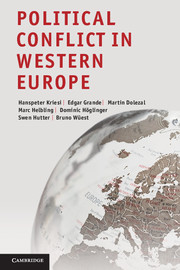Preface and acknowledgments
Published online by Cambridge University Press: 05 August 2012
Summary
This book is the second major outcome of an exciting scientific collaboration on the political consequences of globalization that started in the early 2000s. It continues and builds upon the work of West European Politics in the Age of Globalization, in which we examined the emergence of a new cleavage and the transformation of party systems in six West European countries (Austria, France, Germany, the Netherlands, Switzerland, and the UK). In a somewhat different composition, the two teams of political scientists at the universities of Zurich and Munich have extended the analysis of the restructuration of West European politics in the years from 2005 until the end of 2009. The team leaders – Hanspeter Kriesi and Edgar Grande – are still the same. From the original team, Martin Dolezal is also still part of the current set of authors. Marc Helbling, Dominic Höglinger, Swen Hutter, and Bruno Wüest have joined the team for the second phase of the project, on which the analyses we present in this volume are based. For this second phase, we again received generous support from the German Research Foundation (SFB 536 – Project C5), and from the Swiss National Science Foundation (100017–111756).
For the present volume, we collected fresh data on national elections, which we now cover up to and including 2007. In addition, we extended our analysis in three directions: we added European elections to the national elections, we included political protest in our analyses, and we innovated by adding in-depth analyses of three issue-specific debates. These debates cover issues that are related to our key hypothesis that globalization is restructuring the national political space – immigration, European integration, and economic liberalism. Compared to the previous study, we pay less attention to the demand side of politics, and predominantly focus on the supply side – the election campaigns at both the national and the European level, protest events in the protest arena, and the contents of the public debates among the political elites in the period 2004–06.
- Type
- Chapter
- Information
- Political Conflict in Western Europe , pp. xv - xviiiPublisher: Cambridge University PressPrint publication year: 2012

